



A year has now passed since the 11 March disaster of 2011. This one-year report provides an overview of the activities undertaken by the Japan Committee for UNICEF (JCU) in collaboration with local residents and aid organizations made possible by the generous donations of people around the world.
UNICEF’s emergency assistance policy emphasizes that it is the children that are the most vulnerable during natural disasters. JCU’s reconstruction effort in Tohoku is still underway, and we will continue to provide emergency relief assistance to children of the Tohoku region in light of UNICEF’s policy of child-focused assistance.
On 6 March an event was held at the UNICEF House in Tokyo where presentations were made to report on relief assistance provided over the past year. The event included reports by JCU staff who have been involved in assistance activities, presentations by onsite staff that have been engaged in the relief effort since the beginning stages, and even a screening of video taken by freelance journalist Akira Ikegami of JCU’s onsite efforts in the affected areas.
A reading was also held of stories about children born on the day of the disaster and their families. Yae, who provided the song for JCU assistance movie message, also played a short concert. The event served as a venue for people to pay consideration to the future of children in the region.
[TOKYO, JAPAN, 7 March 2012]
Nearly a year has passed since the unprecedented disaster that shook Japan in March 2011. On Tuesday, 6 March, the Japan Committee for UNICEF (JCU) held an event where it reported on the emergency relief and ensuing reconstruction activities that it has undertaken in the past one year in order to assist affected children and their families.
******* Report Excerpts *******
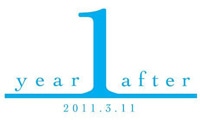 |
The Japan Committee for UNICEF could not have implemented such an extensive assistance campaign on its own. It was only through the assistance and cooperation of various individuals on multiple levels, and through generous donations from countless kind hearts, that we were able to continue to provide this aid.
Directly after the earthquake we delivered toys to the affected areas as a form of relief supplies. Delivering these toys, however, was no easy task. When we first arrived in the disaster areas on 15 March, there was no water, food or even gasoline. People had absolutely no idea why we chose to bring toys. Nevertheless, when I explained that it was precisely due to such circumstances that we had to provide children with toys to create an environment where they could be at ease, the Board of Education in Miyagi Prefecture agreed to distribute the toys. Later, however, the toys were deemed to fall outside of the scope of relief supplies by the assistance headquarters in the prefecture, and were sent to the back of the storage area. That is when the prefectural co-ops, which have provided assistance to UNICEF for many years, mobilized their trucks to offer logistical assistance. Thanks to a decision by the Board of Education and the mobility of the co-ops, we were able to deliver the toys to shelters throughout the prefecture.
JCU has also been able to assist schools in quickly reopening their doors. This was possible due to the strong efforts of those active on the front line, including individual schools and the boards of education, the cooperation of local volunteer organizations, and numerous corporations that provided stationery and other school supplies. Initially, there were also various obstacles related to land acquisition and land management that hindered the reconstruction of kindergartens and preschools. There were even times when sound consideration must be paid to the true effectiveness of aid. JCU has heard from individuals who voiced a genuine need for certain preschools. Such insight is invaluable for JCU and assists us in making informed decisions. Several reconstruction projects for preschools and kindergartens of high need continue today, and there are plans to complete a number of permanent and temporary facilities between April to the summer.
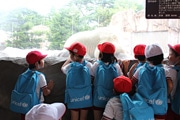 |
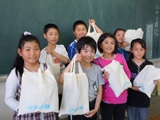 |
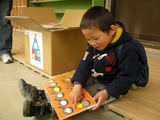 |
As an example of psychosocial and other psychological assistance for children, clinical psychologists and nursery staff have formed teams and are extending assistance to mothers and children at shelters. These efforts would not have been possible without the cooperation of such experts. JCU has learned that an important aspect of psychosocial assistance is encouraging constant affection between adults and children. Moving forward JCU will continue to work together with specialists that teach adults how to be there for children and provide them with the necessary advice when needed.
UNICEF and JCU strive to create a society where the rights of children are protected; however, in order to protect the rights of children there must be people to carry out the duty to protect. It is our responsibility as adults to ensure a future for our children 20 and 30 years down the road. We ask for your continued support as JCU continues to devote its best efforts to this cause.
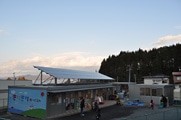 |
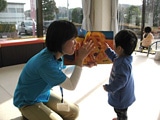 |
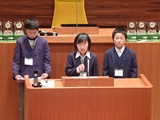 |
||
| © Japan Committee for UNICEF/2011/K.Goto |
On the child protection front, a new undertaking is underway—assistance for single-father households. Fathers that have been left to raise their children on their own are unable to express the difficulties that they face, feel embarrassed when undertaking household chores and child-rearing, and sometimes feel a general sense of misery in their life. Assistance for single-father households is carried out with the cooperation of various partners, and includes networking fathers and efforts to develop aid management that extends care to such single fathers. These opportunities allow fathers to share their feelings and information with other fathers, providing them with a sense of relief and comfort, which in turn positively impacts their children. This assistance is thus important for children as well.
Moving forward more focus is going to be placed on child protection and psychosocial assistance. This means that the role of JCU’s regional associations will become more important. I also hope to work with universities and other groups in fostering a robust younger generation.
An image of the disaster area directly after the earthquake
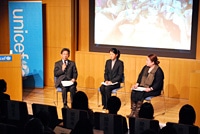 |
-UNICEF activities overseas and assistance for Eastern Japan
-Assistance for evacuees from Fukushima
-Considering the future of the children
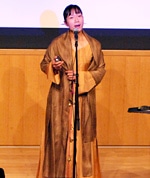 |
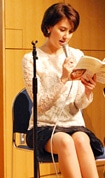 |
|
| Singer Yae presents a beautiful song to the audience. | Maya Masai performs a heartfelt reading. |
During the second half of the event, Ms. Maya Masai presented readings of two stories from “Happy Birthday 3.11” and singer Yae performed “Like the nameless flower” and two other songs in a mini concert for the attendees.
Click here to view video of the event »
©All photo credits: c Japan Committee for UNICEF